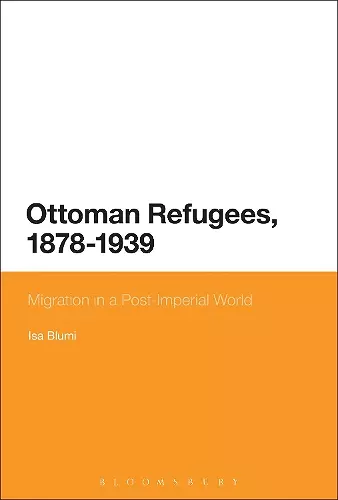Ottoman Refugees, 1878-1939
Migration in a Post-Imperial World
Format:Hardback
Publisher:Bloomsbury Publishing PLC
Published:12th Sep '13
Currently unavailable, and unfortunately no date known when it will be back

Investigates how refugees of the Ottoman Empire have affected global events from 1878 to the Second World War.
In the first half of the 20th century, throughout the Balkans and Middle East, a familiar story of destroyed communities forced to flee war or economic crisis unfolded. Often, these refugees of the Ottoman Empire - Christians, Muslims and Jews - found their way to new continents, forming an Ottoman diaspora that had a remarkable ability to reconstitute, and even expand, the ethnic, religious, and ideological diversity of their homelands.
Ottoman Refugees, 1878-1939 offers a unique study of a transitional period in world history experienced through these refugees living in the Middle East, the Americas, South-East Asia, East Africa and Europe. Isa Blumi explores the tensions emerging between those trying to preserve a world almost entirely destroyed by both the nation-state and global capitalism and the agents of the so-called Modern era.
Blumi (Georgia State Univ., Reinstating the Ottomans, 2011) has written a very sophisticated analysis of refugees during the late- and post-Ottoman periods that shows the complexities of refugee identity within the empire. In doing so, he recognizes the role played by the linguistic, religious, and ethnic diversity of these people, which at times finds the various interests and identities of refugees pitted against each other. Throughout the work, Blumi highlights the trauma of the Ottoman refugee studies, it gives the readers a larger perspective of the refugee experience, not one limited geographically or otherwise. Blumi, whose vast linguistic abilities allow him to reach across the empire from Albania to Yemen, adds a much-needed theoretical foundation to the study of Ottoman refugees. He shows how refugees in their struggle to survive were forced to contend with the interests of global capitalism in both the nation-states arising from the Ottoman Empire and elsewhere, especially Latin America. Valuable for students of Ottoman history as well as most general refugee studies. Summing Up: Highly recommended. -- R.W. Zens * CHOICE *
This study examines many refugee groups and geographic regions and taps into multiple historiographical debates, whether on violence, integration, or Subaltern agency. The unifying theme of global capitalism holds these eclectic pieces together very well in a complicated narrative. This thought-provoking work should be of interest not only to Ottoman and Middle Eastern specialists but also to theorists in refugee studies, world historians, and students of global capitalism. -- Vladimir Troyansky, Stanford University * Journal of Refugee Studies *
Blumi’s book is a valuable contribution to Ottoman studies … It addresses issues that had been only occasionally scrutinized, and it provides valuable insights. It is also an effort to 'deorientalize' and 'de-provincialize' the Ottoman Empire. The account is also a global history. Addressing international networks and connections, it breaks down national borders that still continue to shape historians’ perceptions, consciously or unconsciously. -- Dogan Gurpinar, Istanbul Technical University * American Historical Review *
ISBN: 9781472515360
Dimensions: unknown
Weight: 594g
296 pages